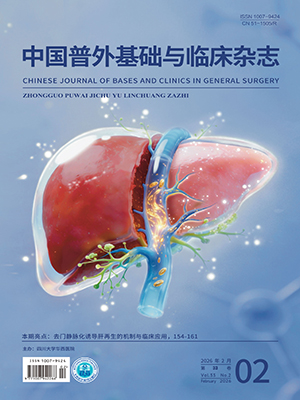| 1. |
Zheng R, Zhang S, Zeng H, et al. Cancer incidence and mortality in China, 2016. J Natl Cancer Cent, 2022, 2(1): 1-9.
|
| 2. |
Bray F, Laversanne M, Sung H, et al. Global cancer statistics 2022: GLOBOCAN estimates of incidence and mortality worldwide for 36 cancers in 185 countries. CA Cancer J Clin, 2024, 74(3): 229-263.
|
| 3. |
Sung H, Ferlay J, Siegel RL, et al. Global Cancer Statistics 2020: GLOBOCAN estimates of incidence and mortality worldwide for 36 cancers in 185 countries. CA Cancer J Clin, 2021, 71(3): 209-249.
|
| 4. |
G?kcen BB, ?anlier N. Coffee consumption and disease correlations. Crit Rev Food Sci Nutr, 2019, 59(2): 336-348.
|
| 5. |
Amawi H, Ashby CR, Samuel T, et al. Polyphenolic nutrients in cancer chemoprevention and metastasis: role of the epithelial-to-mesenchymal (EMT) pathway. Nutrients, 2017, 9(8): 911. doi: 10.3390/nu9080911.
|
| 6. |
van Dam RM, Hu FB, Willett WC. Coffee, caffeine, and health. N Engl J Med, 2020, 383(4): 369-378.
|
| 7. |
Villota H, Santa-González GA, Uribe D, et al. Modulatory effect of chlorogenic acid and coffee extracts on wnt/β-catenin pathway in colorectal cancer cells. Nutrients, 2022, 14(22): 4880. doi: 10.3390/nu14224880.
|
| 8. |
Villota H, Moreno-Ceballos M, Santa-González GA, et al. Biological impact of phenolic compounds from coffee on colorectal cancer. Pharmaceuticals (Basel), 2021, 14(8): 761. doi: 10.3390/ph14080761.
|
| 9. |
房立源, 王潤兮, 方宇航, 等. 兩樣本孟德爾隨機化研究咖啡消費與消化系統腫瘤的因果關系. 現代預防醫學, 2023, 50(21): 3901-3905, 3935.
|
| 10. |
Stang A. Critical evaluation of the Newcastle-Ottawa scale for the assessment of the quality of nonrandomized studies in meta-analyses. Eur J Epidemiol, 2010, 25(9): 603-605.
|
| 11. |
Higgins JP, Thompson SG, Deeks JJ, et al. Measuring inconsistency in meta-analyses. BMJ, 2003, 327(7414): 557-560.
|
| 12. |
Harrel FE. Regression modeling strategies: with applications to linear models, logistic regression, and survival analysis. Springer-Verlag New York: New York, USA, 2003, 22(15): 2531-2532.Harrel FE. Regression modeling strategies: with applications to linear models, logistic regression, and survival analysis. Springer-Verlag New York: New York, USA, 2003, 22(15): 2531-2532.
|
| 13. |
Greenland S. Dose-response and trend analysis in epidemiology: alternatives to categorical analysis. Epidemiology, 1995, 6(4): 356-365.
|
| 14. |
Orsini N, Li R, Wolk A, et al. Meta-analysis for linear and nonlinear dose-response relations: examples, an evaluation of approximations, and software. Am J Epidemiol, 2012, 175(1): 66-73.
|
| 15. |
Mackintosh C, Yuan C, Ou FS, et al. Association of coffee intake with survival in patients with advanced or metastatic colorectal cancer. JAMA Oncol, 2020, 6(11): 1713-1721.
|
| 16. |
Hu Y, Ding M, Yuan C, et al. Association between coffee intake after diagnosis of colorectal cancer and reduced mortality. Gastroenterology, 2018, 154(4): 916-926.
|
| 17. |
Guercio BJ, Sato K, Niedzwiecki D, et al. Coffee intake, recurrence, and mortality in stage Ⅲ colon cancer: results from CALGB 89803 (Alliance). J Clin Oncol, 2015, 33(31): 3598-3607.
|
| 18. |
Gapstur SM, Anderson RL, Campbell PT, et al. Associations of coffee drinking and cancer mortality in the cancer prevention study-Ⅱ. Cancer Epidemiol Biomarkers Prev, 2017, 26(10): 1477-1486.
|
| 19. |
Oyelere AM, Kok DE, Bos D, et al. Coffee consumption is associated with a reduced risk of colorectal cancer recurrence and all-cause mortality. Int J Cancer, 2024, 154(12): 2054-2063.
|
| 20. |
Sun H, Liu Y, Huang H, et al. Diet quality score and survival rate in patients with colorectal cancer. Asia Pac J Clin Nutr, 2019, 28(3): 601-606.
|
| 21. |
Sugiyama K, Kuriyama S, Akhter M, et al. Coffee consumption and mortality due to all causes, cardiovascular disease, and cancer in Japanese women. J Nutr, 2010, 140(5): 1007-1013.
|
| 22. |
Becerra-Tomás N, Markozannes G, Cariolou M, et al. Post-diagnosis adiposity and colorectal cancer prognosis: a Global Cancer Update Programme (CUP Global) systematic literature review and meta-analysis. Int J Cancer, 2024, 155(3): 400-425.
|
| 23. |
Hou N, Liu N, Han J, et al. Chlorogenic acid induces reactive oxygen species generation and inhibits the viability of human colon cancer cells. Anticancer Drugs, 2017, 28(1): 59-65.
|
| 24. |
Murad LD, Soares Nda C, Brand C, et al. Effects of caffeic and 5-caffeoylquinic acids on cell viability and cellular uptake in human colon adenocarcinoma cells. Nutr Cancer, 2015, 67(3): 532-542.
|
| 25. |
Kang NJ, Lee KW, Kim BH, et al. Coffee phenolic phytochemicals suppress colon cancer metastasis by targeting MEK and TOPK. Carcinogenesis, 2011, 32(6): 921-928.
|
| 26. |
Cornelis MC, Byrne EM, Esko T, et al. Genome-wide meta-analysis identifies six novel loci associated with habitual coffee consumption. Mol Psychiatry, 2015, 20(5): 647-656.
|
| 27. |
Loftfield E, Cornelis MC, Caporaso N, et al. Association of coffee drinking with mortality by genetic variation in caffeine metabolism: findings from the UK biobank. JAMA Intern Med, 2018, 178(8): 1086-1097.
|
| 28. |
徐進文. 雌激素通過改善內臟脂肪功能影響血脂、胰島素敏感性. 廣州: 中山大學, 2010.
|




